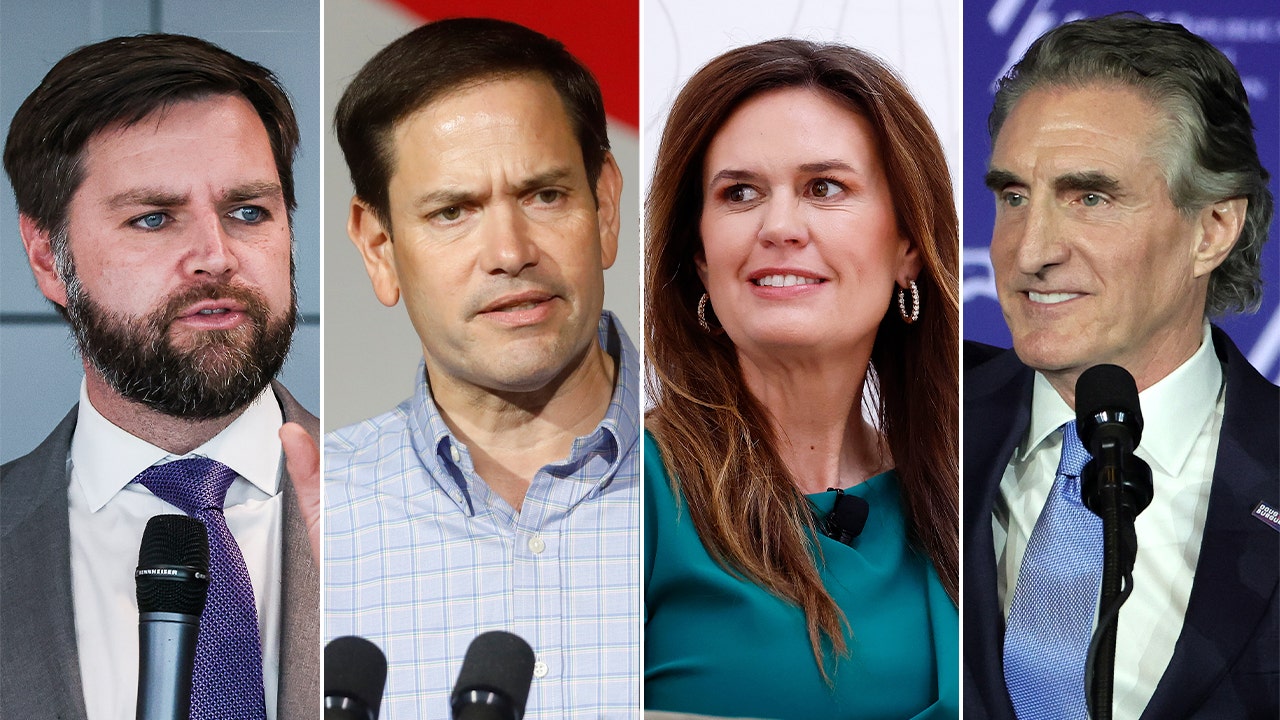World
EU-made high tech should not prop China’s military, von der Leyen says
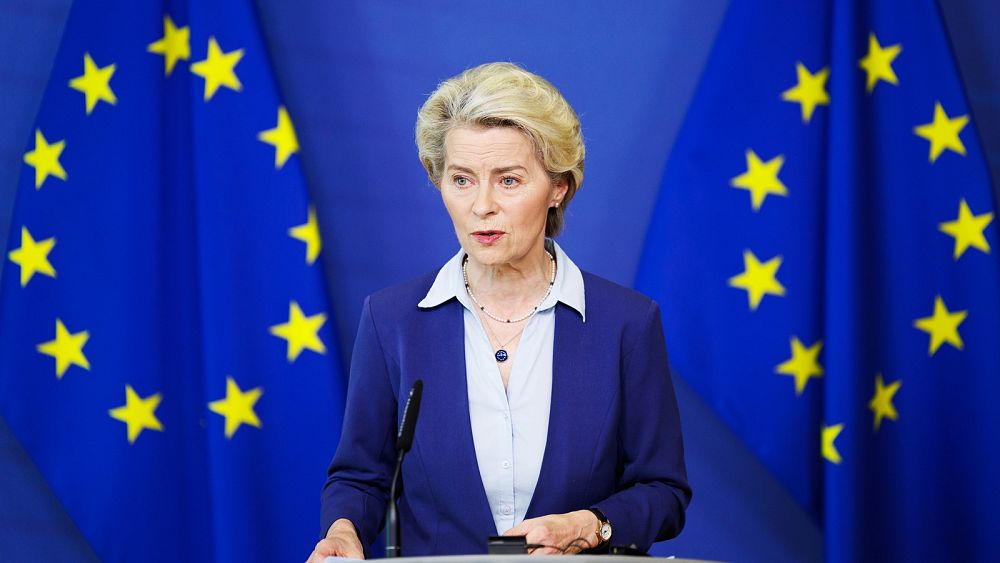
Members of the European Union should think twice before selling sensitive advanced technology to countries that seek to “undermine international peace.”
Exports of state-of-the-art products, such as quantum computing, semiconductors and artificial intelligence, deserve an additional layer of supervision, the European Commission has recommended in its first-ever economic security strategy.
“We’re looking at a limited, small set of cutting-edge technologies. And here we want to make sure that they do not enhance the military capacities of some countries of concern,” Ursula von der Leyen said on Tuesday afternoon.
While the European Commission chief insisted the strategy was “country-agnostic” and respected open markets, it soon became evident the main target of the document was China, the world’s second-largest economy and one of the bloc’s main trading partners
Von der Leyen has pioneered the concept of “de-risking” to deal with Beijing, a middle ground that is supposed to fall somewhere between close engagement and total detachment. The term, first introduced in a landmark speech in late March, was later endorsed by the Group of Seven (G7) in Hiroshima, reflecting its growing appeal.
The strategy unveiled on Tuesday can be considered an attempt to clarify what “de-risking” actually looks like in practice.
“Given the changing nature of the risks, we now need a strategic vision for how we are going to handle these risks,” von der Leyen said.
Relations between the EU and China have become severely strained over the past year as a result of Beijing’s continued refusal to condemn Russia’s invasion of Ukraine, its belligerent rhetoric around Taiwan, trade retaliation against Lithuania, online disinformation campaigns and what von der Leyen has previously described as the “explicit fusion” of the country’s military and commercial sectors
But despite the litany of friction points, the bloc remains highly dependent on China for certain products that are essential to thrive in the 21st century, including solar panels, batteries and rare earths.
Brussels worries that if relations deteriorate any further or an armed conflict breaks out in the South China Sea, these entrenched dependencies will backfire and wreak havoc across the entire European economy – a bleak scenario that is rooted in the aftermath of Russia’s invasion of Ukraine when the Kremlin actively manipulated gas pipelines in retaliation for Western sanctions.
The lessons learned from the COVID-19 pandemic, which saw prosperous countries scramble to secure basic goods like face masks and hand sanitisers, also resonate loudly across the new strategy.
“Many of the issues (…) have revealed inherent vulnerabilities in our economies. And they have opened our eyes to the increasing – and increasingly complex – risks to national security and economic resilience,” von der Leyen told reporters.
“The world has become more contested and geopolitical.”
Greater coordination and oversight
The economic security strategy, which is non-binding, has three overarching objectives: promote Europe’s competitiveness, protect Europe from potential risks and partner with allies to diversify Europe’s supply chains.
The second goal – protection – is arguably the central element of the 14-page-long document and focuses on the major threats against Europe’s supply chains, critical infrastructure, technology and economic coercion.
The strategy does not propose banning or restricting exports of any specific product, a prerogative that remains the exclusive competence of member states.
Instead, the Commission puts together a series of policy tools – both existing and forthcoming – that can help governments improve their oversight over sales of sensitive technology and flows of foreign investment, with the goal of detecting harmful side effects and acting before the damage is done.
The executive plans to come up with a common list of dual-use technologies – those that can be used for both military and civilian purposes – by September and ask member states what degree of extra protection the selected products should be granted, if any.
A preview of this debate was offered earlier this year when the Netherlands moved to curb sales of machinery to manufacture ultra-advanced semiconductors that were destined for the Chinese market. The decision, meant to prevent “undesirable purposes,” prompted Washington’s applause and Beijing’s condemnation.
Following up on the Dutch case, which perfectly encapsulates the geopolitical stakes of the technological race, the Commission makes the case for stronger and faster coordination at the EU level to avoid a free-for-all landscape of bans and restrictions.
“An uncoordinated proliferation of national controls by member states would create loopholes and undermine (the) integrity of the single market,” the strategy reads. “Possible divergences between member states would weaken the economic security of the EU as a whole.”
Besides exports of goods, Brussels also intends to reinforce its surveillance over investment projects involving countries that “operate civil-military fusion strategies,” coded language for China.
The Commission already has legal instruments to oversee foreign investment coming into the bloc and foreign takeovers of domestic companies. Now, it wants to have a new tool to monitor investments flowing from the EU towards other nations where technology secrets and know-how might be leaked or stolen.
“Outbound investment means we need to ensure that European companies’ capital, their knowledge, their expertise, their research, is not abused by countries of concern for military application,” von der Leyen said, promising to put forward a legislative proposal before the end of the year.
The idea of screening outbound investment, however, is highly contentious and faces an uphill struggle to get off the ground. It is still unclear how the Commission could track, or even block, the corporate decisions taken by European companies while respecting their freedom to do business.
The first reactions to the strategy are set to land next week, when EU leaders will gather in Brussels for a two-day summit. The discussions are expected to be intense as governments have been traditionally reluctant – or downright opposed – to let the European institutions meddle with aspects of national security.
Tobias Gehrke, a senior policy fellow at the European Council on Foreign Relations (ECFR), welcomed the Commission’s document and the selection of potential risks but said it fell short of addressing “the great power race for techno-industrial leadership” between China and the United States.
“The EU’s division between trade instruments controlled by the European Commission and security instruments controlled by member states is increasingly inadequate in the face of technological and industrial rivalry where economic security and national security are intertwined,” Gehrke said in a statement.

World
‘SNL’ Cold Open Riffs on Trump Trial and His VP Picks

The 49th season finale of “Saturday Night Live” opened with James Austin Johnson as Donald Trump speaking at the barricades of a Manhattan courthouse, in a nod to Trump’s ongoing legal woes amid his presidential campaign.
During the sketch, Johnson as Trump spoke about his “weird and depressing” state at the courthouse, saying, “I don’t like being in court because they say very mean things about me as I’m trying to sleep.” (It was reported that Trump fell asleep in court during proceedings.) He goes on to say, “Now that my defense is supposed to begin on Monday, I would love to testify; I’m not afraid to testify at all, I’m just not going to out of fear.”
He continues to say how he doesn’t want to go back to the White House, “But it appears people want to send me there.” Johnson’s Trump pokes fun at Trump’s rigged election claims, too. “For me, it’s much better for me to not win and say it was rigged.”
Making fun of Trump’s sexist comments about women (and how he once said Heidi Klum is “no longer a 10”), Johnson, as Trump says of a juror at his trial, “They call her juror 9, but to me, she’s like a six, baby.”
Johnson’s Trump then introduced three of his potential VP candidates. “We love to say ‘VP’, like ‘Veep’ with Elaine from ‘Seinfeld.’ She can’t dance!” He says he won’t announce his VP just yet. “In many ways, it will be determined by the winner of the Jake Paul-Mike Tyson fight.” Trump says he’s invited a few people from “my short bus––I mean my shortlist.”
He brings out South Carolina Governor Tim Scott (played by Devon Walker). “I’m here to help Trump win the Black vote,” he says. Trump adds, “I’m more popular than you among the Blacks, which is really saying something.” Walker, as Scott says, “Black people have called my support humiliating, but trust me, I am my own man!”
Trump then brings out South Dakota Governor Kristi Noem (played by Heidi Gardner), wearing a red MAGA hat, holding a stuffed dog, and pointing a fake gun at the dog (a reference to her shooting a dog). “She shot a dog, which you really can’t do…but on the other hand, she shot a dog, which is pretty awesome.” Gardner, as Noem chimes in and says, “I kill goats, too!”
Finally, he wheels out his final VP pick, “The late great Hannibal Lecter!” Trump says, as Mikey Day as Hannibal Lecter is wheeled out in an orange jumpsuit and wearing the famous mask. “I think he’d really scare everybody at the border. “Get him out of here, he’s giving me Pence vibes,” says Trump, as Hannibal Lecter is then wheeled away.
Trump says it’s going to be “the summer of Trump. You’re gonna get that Trump espresso,” he sings in a reference to a Sabrina Carpenter song. Johnson, as Trump says he’ll be selling more Trump Bibles as well, along with a “Trump Torah.”
Trump finishes the cold open shouting, “In the words of my mentor, the late great Hannibal Lecter, “Live from New York, it’s Saturday night!”
This week’s “SNL” host is actor Jake Gyllenhaal, and Sabrina Carpenter stars as the week’s musical guest.
Watch the sketch below:
World
Blue flash caught in night sky over Spain, Portugal lights up social media
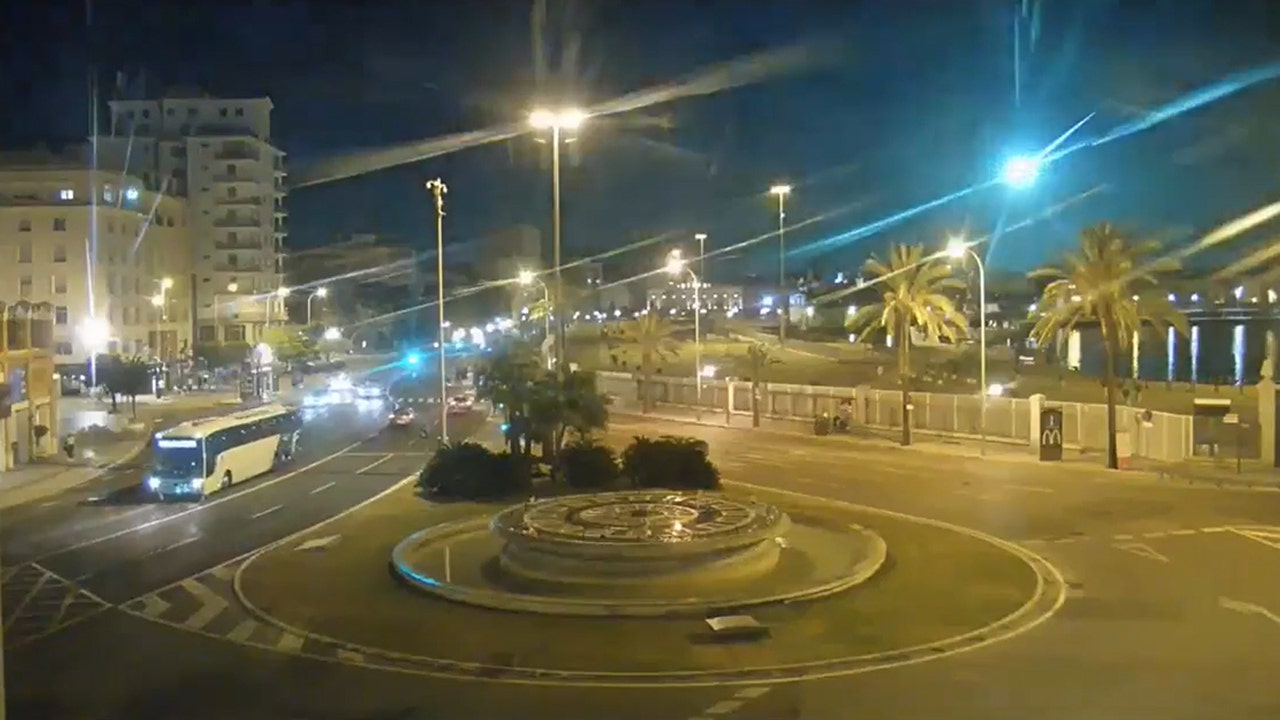
It’s a bird… it’s a plane… it’s a blue meteor? Fireball? Piece of a comet?
Whatever it was, it lit up the night sky for millions of people early Sunday morning in Spain and Portugal. Social media users took stunning pictures and videos for all to revel in the natural science phenomenon.
The spectacular sight crossed the night sky at 12:46 a.m., according to CCTV footage released by the mayor’s office in Cádiz.
The European Space Agency (ESA) Operations says the “blue meteor” everyone is referring to was actually “a small piece of a comet” that flew over the European countries at the speed of 45 kilometers a second, which is equivalent to almost 28 miles.
MERGER OF MASSIVE BLACK HOLES FROM EARLY UNIVERSE UNCOVERED BY WEBB TELESCOPE, SCIENTISTS SAY
It burned up over the Atlantic Ocean at an altitude of 60 kilometers, or more than 37 miles above the surface.
“The likelihood of any meteorites being found is very low,” ESA Operations tweeted after the agency’s Planetary Defence Office analyzed the size and trajectory of the object.
SCIENTISTS DISCOVER LARGE, ‘COTTON CANDY-LIKE’ PLANET WITH UNUSUALLY LOW DENSITY
The night sky in Cadiz, Spain, prior to the fireball’s appearance. (Ayuntamiento de Cadiz via Storyful)
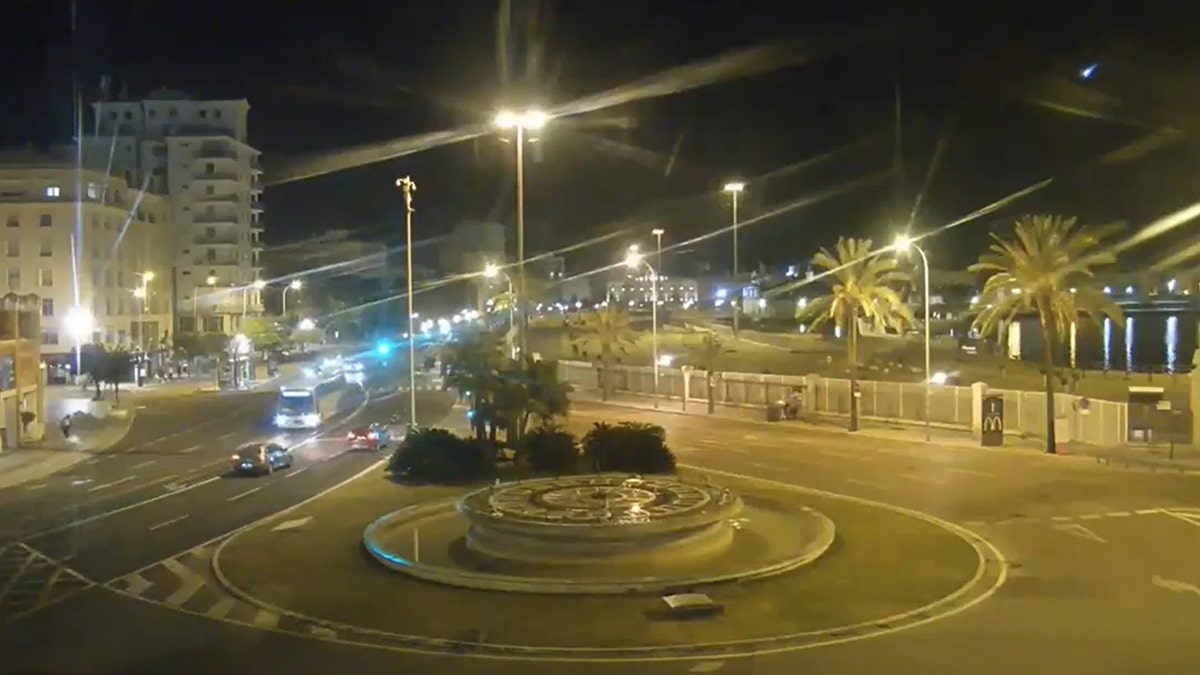
The moment the blue fireball first appeared on the camera rolling at the Cadiz mayor’s office. (Ayuntamiento de Cadiz via Storyful)
National Aeronautics and Space Administration explains the color was likely due to magnesium, and that “meteor color depends on whether the metal atom emissions or the air plasma emissions dominate.”
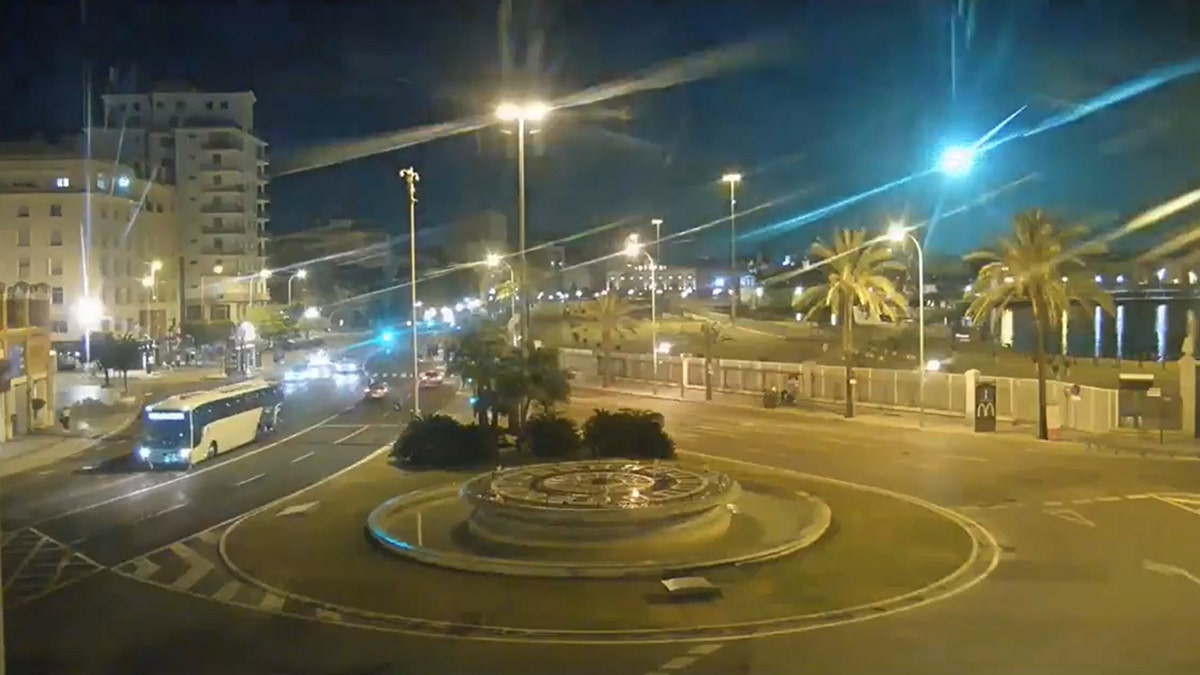
The blue fireball lit up Spain’s sky early in the morning May 19, 2024. (Ayuntamiento de Cadiz via Storyful)
“Short-period comets, also known as periodic comets, originate from a disk-shaped band of icy objects known as the Kuiper Belt beyond Neptune’s orbit, with gravitational interactions with the outer planets dragging these bodies inward, where they become active comets,” Space.com states.
Many on social media referred to what they witnessed as a “once in a lifetime sight,” according to news.com.au, with at least one joking, “That’s no meteor, that’s Optimus Prime.”
Fox News’ Mitch Picasso contributed to this report.
World
How is Azerbaijan involved with France and New Caledonia?
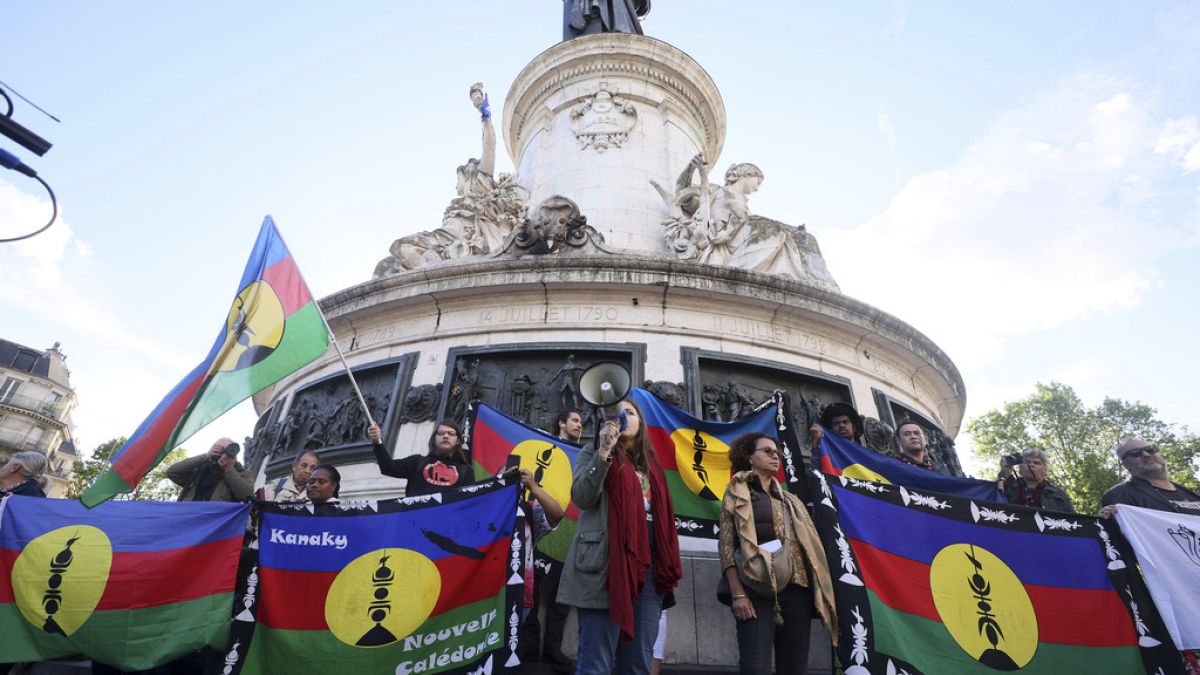
France has accused Azerbaijan of meddling in its Pacific territory, New Caledonia, by supporting independence movements and spreading disinformation, amid broader geopolitical tensions.
France has accused Azerbaijan of meddling in its Pacific archipelago territory of New Caledonia.
Despite the vast geographical and cultural distance between the Caspian state and the French Pacific territory, this claim is rooted in a complex web of historical, political, and diplomatic tensions.
The Crisis in New Caledonia
New Caledonia, located between Australia and Fiji, is a French territory with a history of striving for independence.
The recent unrest in New Caledonia was ignited by a new electoral law perceived by the indigenous Kanak population as discriminatory.
This law allows people who have lived in New Caledonia for at least ten years the right to vote in local elections, which pro-independence supporters argue will dilute the Kanak vote.
France’s Accusations
France’s Interior Minister, Gérald Darmanin, has publicly stated that Azerbaijan, along with China and Russia, is interfering in New Caledonia’s internal matters. “This isn’t a fantasy. It’s a reality,” Darmanin told the France 2 TV channel, emphasizing the seriousness of the allegations.
The French government points to the sudden appearance of Azerbaijani flags at Kanak independence protests and the backing of separatists by groups linked to Baku.
Azerbaijan has vehemently denied any involvement, calling the accusations baseless. “We completely reject the baseless accusations,” said Ayhan Hajizadeh, a spokesperson for Azerbaijan’s Foreign Ministry. “We refute any connection between the leaders of the struggle for freedom in Caledonia and Azerbaijan.”
A significant element in this story is the Baku Initiative Group, established during a conference in July 2023 in Azerbaijan. This group, which includes participants from various French territories seeking independence, aims to support anti-colonial movements against France.
The group has expressed solidarity with the Kanak people and condemned the recent electoral reforms in New Caledonia. “We stand in solidarity with our Kanak friends and support their fair struggle,” the Baku Initiative Group stated.
Why are France and Azerbaijan clashing diplomatically?
The tensions between France and Azerbaijan extend beyond New Caledonia. France is a traditional ally of Armenia, Azerbaijan’s historical rival, particularly regarding the contentious Nagorno-Karabakh region.
Following the 2020 war and a subsequent 2023 offensive by Azerbaijan to reclaim control of Nagorno-Karabakh, France has openly supported Armenia.
This support includes defence agreements and military equipment supplies, fuelling further animosity from Azerbaijan. Darmanin referred to Azerbaijan as a “dictatorship,” highlighting the deep-seated distrust.
France has also accused Azerbaijan of engaging in disinformation campaigns to destabilise its territories. Pro-Azerbaijani social media accounts have been linked to the spread of misleading content about the French police’s actions in New Caledonia.
A French government source mentioned a “pretty massive campaign, with around 4,000 posts generated by (these) accounts,” aimed at inciting violence and mistrust.
This follows France recalling its ambassador to Azerbaijan in April, with President Macron expressing regret for Azerbaijan’s actions, along with his hope that the Azerbaijanis would clarify their intentions.
Why New Caledonia?
While Azerbaijan’s direct interest in New Caledonia might seem far-fetched, it fits into a broader strategy of challenging the French colonial legacy and supporting separatist movements.
By aligning with anti-colonial sentiments, Azerbaijan aims to position itself as a champion of liberation movements, simultaneously discrediting France on the international stage.
This effort is seen as part of a broader geopolitical manoeuvering, including Azerbaijan’s efforts to tarnish France’s image, as noted by its alleged disinformation campaign against France’s capability to host the Olympic Games.
The heightened tensions have had further repercussions. The French Sports Minister cancelled the Olympic flame’s journey through New Caledonia, for security reasons, but also an action that reflects the severity of the unrest and the accusations of foreign interference.
The involvement of Azerbaijan in New Caledonia’s unrest is a multifaceted issue rooted in broader geopolitical rivalries and historical grievances.
For Azerbaijan, supporting independence movements in French territories is a way to strike back at France for its support of Armenia and to bolster its own international standing.
For France, these actions represent a direct challenge to its sovereignty and stability in its overseas territories, prompting strong accusations and heightened tensions between Paris and Baku.
-

 World1 week ago
World1 week agoIndia Lok Sabha election 2024 Phase 4: Who votes and what’s at stake?
-

 World1 week ago
World1 week agoUkraine’s Zelenskyy fires head of state guard over assassination plot
-

 Politics1 week ago
Politics1 week agoFox News Politics: No calm after the Stormy
-

 Politics1 week ago
Politics1 week agoTales from the trail: The blue states Trump eyes to turn red in November
-

 World1 week ago
World1 week agoBorrell: Spain, Ireland and others could recognise Palestine on 21 May
-

 News7 days ago
News7 days agoSkeletal remains found almost 40 years ago identified as woman who disappeared in 1968
-

 Politics1 week ago
Politics1 week agoUS Border Patrol agents come under fire in 'use of force' while working southern border
-

 World1 week ago
World1 week agoCatalans vote in crucial regional election for the separatist movement

















